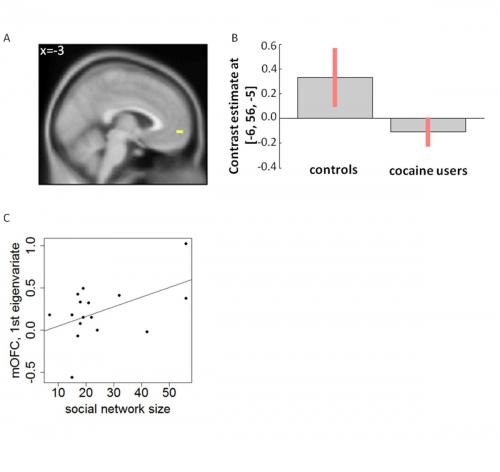Image: Cocaine users show low activity in the medial orbitofrontal cortex
Regular cocaine users have difficulties in feeling empathy for others and they exhibit less prosocial behavior. A study at the Psychiatric Hospital of the University of Zurich now suggests that cocaine users have social deficits because social contacts are less rewarding for them. Social skills should therefore be trained during the treatment of cocaine addiction.
In Europe as well as worldwide, cocaine is the second most frequently used drug after cannabis. Chronic cocaine users display worse memory performance, concentration difficulties, and attentional deficits but also their social skills are affected as previous studies at the Psychiatric Hospital of the University of Zurich suggested. These investigations also revealed that cocaine users have difficulties to take the mental perspective of others, show less emotional empathy, find it more difficult to recognize emotions from voices, behave in a less prosocial manner in social interactions, and they reported fewer social contacts. Moreover, worse emotional empathy was correlated with a smaller social network. The scientists now assume that social cognitive deficits contribute to the development and perpetuation of cocaine addiction.
In their current investigation published in the Proceedings of the National Academy of Sciences, the psychologists Katrin Preller und Boris Quednow, Head of the Division of Experimental and ClinicalPharmacopsychology at the Psychiatric Hospital of the University of Zurich, conclude that impaired social interaction skills of cocaine users could be explained by a blunted response to social reward.
Social interaction is less rewarding
The research team demonstrated that cocaine users perceived joined attention – the shared attentional focus of two persons on an object after gaze contact – as less rewarding compared to drug-naive healthy controls. In a subsequent functional imaging experiment they showed that cocaine users showed a blunted activation of a crucial part of the reward system – the so called medial orbitofrontal cortex – during this basal kind of social interaction. Interestingly, a weaker activation of the medial orbitofrontal cortex during social gaze contact was also associated with fewer social contacts in the past weeks. Quednow explains: “Cocaine users perceive social exchange as less positive and rewarding compared to people who do not use this stimulant”.
As proposed by Preller and Quednow, such changes in brain function might help to explain why dependent cocaine users often fail to stop using drugs despite the occurrence of severe social consequences such as familial problems, loss of friends or employment. Reduced reward during social interactions might also explain why many cocaine dependent individuals loose supportive social contacts during the course of their drug career, which probably further contributes to the maintenance of addiction. Given that social reward is important for successful psychotherapy, Preller and Quednow suggest: “Social skills, such as empathy, mental perspective taking, and prosocial behavior, should be trained during the treatment of cocaine dependence to enhance the efficacy and sustainability of the treatment”.
More information: Katrin H. Preller, Marcus Herdener, Leonhard Schilbach, Philipp Stämpfli, Lea M. Hulka, Matthias Vonmoos, Nina Ingold, Kai Vogeley, Philippe N. Tobler, Erich Seifritz and Boris B. Quednow. Functional changes of the reward system underlie blunted response to social gaze in cocaine users. PNAS. January 20, 2014. DOI: 10.1073/pnas.1317090111
Journal reference: Proceedings of the National Academy of Sciences ![]()
![]()
